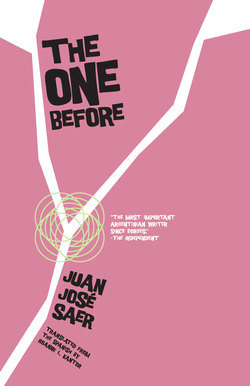Читать книгу The One Before - Juan José Saer - Страница 18
На сайте Литреса книга снята с продажи.
ОглавлениеThe Lookalike
A friend of mine, a writer, having discovered his wife was cheating on him with a bank employee (when usually it’s the wives of bank employees who cheat on their spouses with writers), left his house one day and after wandering in the mountains for a while, working at a newspaper in Mendoza, The Andes, I think, and living off the beneficence of a wine merchant who supported poets and painters, disappeared completely, without dropping the smallest hint to me or to any of his friends about where he might be, until one morning in March when I was obliged to get up early (I live on the outskirts of the city, in the Colastiné Norte), when I opened the front door and suddenly found myself facing a man on horseback, who told me he was passing through the local post office and, when he mentioned he was headed in the direction of my house, had collected a letter for me that had been gathering dust at the post office for more than two months—it was airmail, because the fine paper envelope was bordered by red and blue stripes, and when I opened it I found that it held a postcard—Hans Memling’s Sybilla Sambetha—on the back of which my friend, from Bruges, Belgium, had written to tell me that he was very well, that he felt 10 years younger, and that he lived with a tiny Japanese woman who never spoke a word and who had learned to brew mate.
People who don’t live here can’t imagine how hot it is, even in March, so that the sun at eight in the morning had already sucked the dew off the leaves hours ago, and its light now roasted my scalp as I waited for the bus, looking at the portrait of the Sybil Sambetha, so familiar to me, though it was the first time I had ever seen it, that the face it reminded me of, even though I couldn’t recall exactly whose it was, grew within me from the wide and rigid stain of pink marbling, stretched even further because of her taught locks disappearing behind, gathered into a conical bun and covered by tulle falling in geometric pleats onto her shoulders, and because her dress, painted in a color I would call “oil,” opened at her throat into a circular collar. The revelation of that memory, the identity of that face, was on the tip of my tongue, if you could call it that, and with ever more effort I tried to figure out who it was, I tried to force that memory from the black backdrop into the great spotlight of my mind, so that it would change from the type of memory that didn’t need to be remembered into something palpable and real. I was still consumed with remembering when the bus arrived, half empty, slow, chromed, alone on the blue strip of asphalt, sparkling in the sun and full of the noise of metal and motors. I took out my ticket and was about to sit when suddenly I saw the Sybil, tranquil and alone, looking at me with her pensive little eyes from the back seat. The porous diagonal light of the sun fell on her face, so that the rosy, marble skin turned a resplendent gold. Her whole face was peppered with blackheads and pimples, some of them crowned with white jewels of pus. But the wide forehead was the same, and her neck rose, free, from the round collar of a cotton dress printed with red and green flowers. I had seen her many times, the disfigured face, the black hair pulled back, taught, her gaze more placid and pensive than one hand hitting the other with a wet wisteria vine—seated on the bench, looking at the river from the door of her father’s ranch, a fisherman whom I went to see from time to time to order a certain fish or a covey of wild ducks. I was about to show her the portrait, but I am a timid man, almost weak of character, and after all, what did it matter?
I’ve seen twins who look very much alike, but never as alike as Sybilla Sambetha and the girl from the coast. And yet, could there be two more different people? Nothing made me consider them so different as to see them looking so alike. For several days this likeness disquieted me and made me feel, by contrast, the reality of difference more than of similarity, because the reality of difference evidences the reality of uniqueness, what Marx mocked, and, melancholically, I thought much about the infinity of trees and of rocks, of faces, of birds, of excrements, of roots, each one unrepeatable and alone, unique; I experienced the clichéd impression of the ocean’s infinite waves and the uncountable sands, of the past, the present, and the future which flow, depending on how you view them, in different directions and crash into each other, forming knots and collisions that we think we can decipher, and suddenly (it was noon and I was lying naked in the sun so that its light would scorch me, my eyes closed and my pores slowly opening with a secret creaking), euphorically, I longed to be a special type of minstrel, the minstrel of the visible world, the minstrel of all things, considering them one after the other, the minstrel of the two Sybils, to give each thing its place with an impartial voice that would equalize and reclaim them, to display in the middle of the day an entire world in which every paradise, every leaf of every paradise, every vein of every leaf of every paradise would be present, so that the entire world could contemplate itself in every part by the light of day and nothing would remain anonymous.
